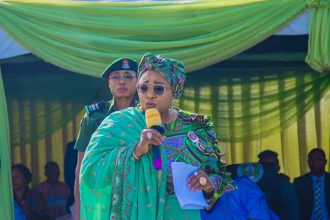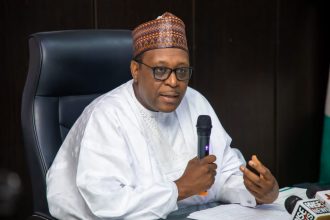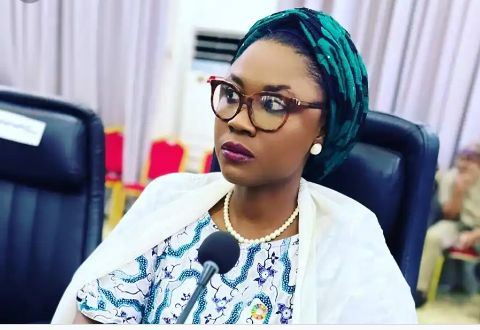Mediaage NG News – ABUJA, Nigeria
The Nigerian Minister of Youth Development, Dr. Jamila Bio Ibrahim over the weekend said the Nigerian government is committed to engaging with stakeholders across all youth sectors in all the six geopolitical zones in the country, as well as directly with the youth.
She also said the engagement is crucial, as it aims to be responsive to “the evolved needs and challenges facing the youth”.
The Minister revealed this at the Inauguration of the National Committee for the Review of the National Youth Policy – 2019-2023 in Abuja, the Nigerian capital.
Describing the inauguration as a significant milestone and a collective effort to redefine and enhance new strategies for youth development in Nigeria, Dr. Bio Ibrahim said it is imperative that the committee utilises best international practices, with drawn insights from valuable bodies like the UNESCO Youth Policy to ensure that it is in line with global standards, while ensuring the unique context of Nigerian youth.
The essence of the committee she said is to include a national policy that broadly address key areas such as education, health and civic engagement, emphasising inclusivity and the integration of modern technology.
“It is essential that the policy is adaptable across the different states and local contents, addressing peculiar challenges faced in our diverse regions, she said.
“This adaptablity will enable acceptability by the state’s who will eventually domesticate the policy in their peculiar state for effective implementation, ensuring that the policy impact is felt across the nation”, she added.
She said the previous policy (2019-23) which elapsed last December, addressed the needs of young Nigerians, categorising them into three distinct groups – low risk youth, especially the vulnerable and the most at risk youth. ‘The goal of this review will be inclusive and extensive, global in view and with local implementation”, the Minister said.
She also acknowledged progress made since July 2023, but admitted that there’s still more to be accomplished, having made made some important observations that include what age range makes a youth.
“In our preliminary review, we identified critical areas such as mental health, environmental issues and climate change that need more attention, alongside underrepresented issues like migration, drug (substance) abuse, and alcohol misuse. The current age range to be called a youth which has sparked a considerable debate is a core part of the review, considering the Nigerian factor affecting the youth, she stated.
Activities of the new committee will be the inauguration of a technical review committee, appointment of consultants to facilitate the policy process, development of section draft and consultations with relevant stakeholders across sectors, as well as in the six geopolitical zones, amongst others.
The committee constitutes persons with experience in youth development, dominated by the youth and chaired by the permanent secretary of the Ministry, Dr. Adurama Ahmed.
Members of the committee include Adesegun Fatusi from the Academy for Development, Sa’adatu Adamu – President of Psychotherapeutic and Counseling Research Institute, Ariola Grace, Youth Development Officer, Dr. Babatunde Adelekan, from the United Nations Population Fund, Azeezat Ishau, the Speaker of the Nigerian Youth Parliament, Ben Dutoye – President, of thr Nigerian Youth Workers Association, Binti Kyari Kolo – Senior Youth Development Officer and Patricia Nebue – Deputy Director, Policy and Strategy Unit from the Office of the Senior Special Assistant to the President on SDGs.
Others include Peace Chia – the Programs Manager, Youth Alive Foundation, Rikki Nwajuofor from the National Youth Council of Nigeria, Risola Abiola – Senior Special Assistant to the President on Citizenship and Leadership, Stella Okeje – Principal Youth Development Officer, Federal Ministry of Youth Development, Titilope Gbadamosi – Special Assistant to the President on Youth Initiatives and Isaac Adeagbo from the Federal Ministry of Youth Development.
They were charged with the responsibility of overseeing the review process, design a review process, ensure comprehensive stakeholders consultation, addressing gaps in the current policy and effective implementation framework of the new policy.






